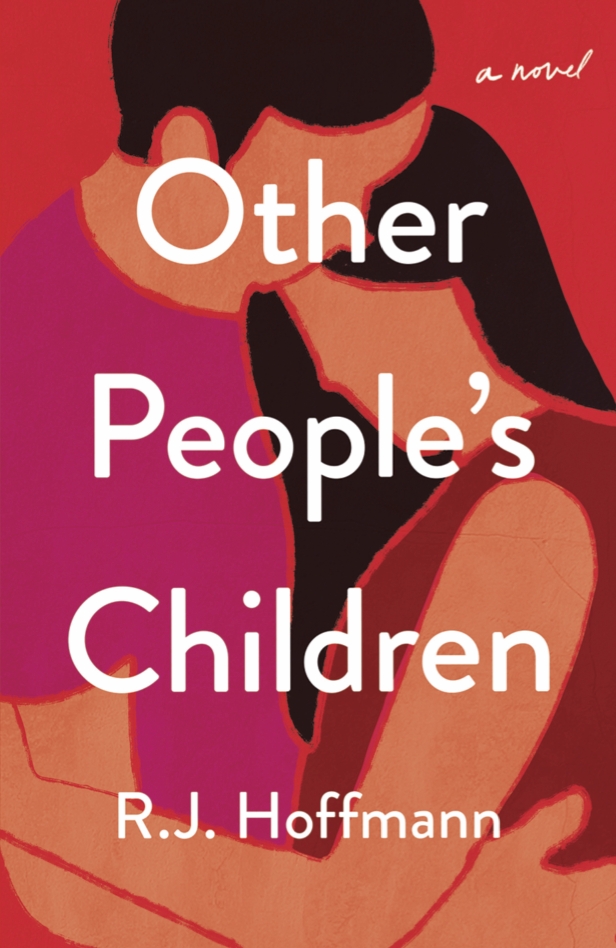WATCH COMMENCEMENT LIVE ON SATURDAY, DECEMBER 14.
Livestream access begins at 9:15 a.m.
In a roundabout way, a failed childhood pact led this tech expert to fulfill his dream of becoming a novelist.
When Jeff Hoffmann ’91 was seven years old, the family television broke beyond repair. His parents wouldn’t replace the unit until he and his two older siblings simultaneously made the honor roll. The trio tried hard, but it would be a few years before they’d have the opportunity. In the interim, Hoffmann had nothing to do but read.
Forty-three years later, all that hard work and reading paid off. He sold his debut novel, “Other People's Children,” to publishing giant Simon & Schuster in a major deal, uncommon for a first-time author.

Released in April under the pseudonym R.J. Hoffmann — “My initials are J.R., but when I said that everybody said ‘Ewing,’ (a reference to the popular ’80s nighttime soap “Dallas”) so we decided that it needed the swap” — the book takes on love, family and the expectations we carry into adulthood. Life doesn’t always turn out as planned, and dealing with those disappointments can be heart-wrenching.
We meet Gail and Jon Durbin, a Chicago-area couple longing for a baby after suffering several miscarriages. Carli, a pregnant 18-year-old who dreams of finishing school, becoming a nurse and getting out of her small town, chooses the couple as prospective adoptive parents for her child.
When the Durbins bring home baby Maya, their family feels complete, but Carli second-guesses her decision — encouraged by her brash and conniving mother — during the mandatory 72-hour wait before signing the final adoption consent. What results is a page-turning read that leaves the reader questioning who to root for and where little Maya will have the best life.
While the novel is a bit of a thriller, many of the themes are personal for Hoffmann. He and his wife, Sara Cummings ’92, experienced the longing, waiting and uncertainty firsthand when they adopted their two children internationally. They also know what it means to fall instantly in love with their adoptive children.
Their daughter struggled during her teens and lived in a residential treatment center for a period. Hoffmann was pursuing a master of fine arts degree in fiction writing at Columbia College Chicago during that time — more on that later — and her difficulty greatly influenced the novel’s serious tone.
“I wrote a number of short stories during my first semester. Pretty much all of them had distance between a parent and a child,” he said. “Some of the heaviness in the book is informed by what my daughter went through and by what my family went through with her. When we adopted Grace, we expected things to be easier for her, but, of course, sometimes life doesn’t cooperate.”
Learning to deal with reality not matching his hopes and expectations weighed on Hoffmann. He also wanted to make sure the characters came across as empathetic, regardless of their beliefs or backgrounds.
What results is a multilayered story told from several viewpoints, with characters of different ages and socioeconomic backgrounds, fighting for what they think is best for their families.
Although the novel’s start centers on miscarriage and birth, Hoffmann chose not to research those topics. Instead, he relied on empathy and advice from an interview with one of his favorite authors, Ian McEwan. The British novelist sometimes avoids describing experiences that are completely foreign, but imagines them instead.
“If I had described it, I worried I might write a story that was disrespectful to women who have gone through those meaningful and traumatic experiences,” said Hoffmann. “I stayed away from concrete details and wrote in metaphor.
“Reading a couple thousand novels in my life — many of them from a woman’s point of view — helps me to imagine a lot of things, but I try to be humble about what I’m able to describe accurately.”
Cummings also lent a hand. “My wife was always my first and most frequent reader, so she helped shape the work as well. She certainly helped me avoid some mistakes when it came to writing from the point of view of women.”
“Other People’s Children” may be female-centric, but to Hoffmann, it isn’t a book about motherhood; it’s about parenthood.
“ALTHOUGH MEN AND WOMEN TALK ABOUT THEIR EMOTIONAL EXPERIENCES VERY DIFFERENTLY, WE ALL FEEL THOSE SAME EMOTIONS. THE CONCLUSION I’VE DRAWN IS THAT IT CAN BE JUST AS DIFFICULT AND WONDERFUL TO BE A FATHER AS IT IS TO BE A MOTHER.”
Born and raised in St. Louis to a high school teacher father and a dental hygienist mother who were big readers, trips to the local library were commonplace.
“I was a regular kid that played soccer, and threw rocks, and shot bottle rockets, but there was this always an undercurrent of books and stories. I raced through the Hardy Boys, and Nancy Drew, and Encyclopedia Brown, but after that, the YA shelf was pretty thin back then.”
Hoffmann started plucking books off his father’s shelves. “I understood some of it, and other parts, not so much,” he said. “But I was exposed to some high-quality writing early on.”
In addition to the love of words, the elder Hoffmanns instilled a significant work ethic into their children. Hoffmann’s father fixed up houses during his summer break and paid his youngest child minimum wage to help spackle, drywall and paint.
As teens, the siblings gave 10% of any earned income to their parents for college savings. The practice taught them the value of hard work and the importance of pursuing higher education. For a middle-class family in the 80s, however, college was not a time to pursue your passions. It was the place to learn a trade and start your career.
“If I told my parents that I wanted to go to college to be a writer, they would have said, ‘That’s nice. How are you going to make your living, though?’ So it never even occurred to me to consider something like that.”
His sister followed in their father’s footsteps and became a teacher, while his brother became an accountant. Hoffmann pursued a finance degree, but stumbled into IT. Choosing Bradley set the trajectory for Hofmann’s business and literary success.
Hoffmann’s first post-graduation job was at Andersen Consulting, the business and technology division of accounting mega-firm Arthur Andersen (now Accenture). Despite taking only one programming course in college, Hoffmann expanded those skills during his eight months with the company. In March of 1992, he and his Sigma Nu fraternity brother Bob Knott ’91 quit their respective jobs to start their own technology consulting company.
“We didn’t know what the hell we were doing; we were teaching ourselves programming as we went,” Hoffmann said. “It was right when Windows was becoming mainstream. We were writing in one of the first languages built for Windows, so we were lucky enough to hit one of those inflection points where long hours can make up for ignorance.”
The duo grew the company to about 35 people and sold it in 1998.
With some success under his belt, Hoffmann and Cummings — who’d been working with nonprofit organizations — were able to take time off. The couple sold everything and traveled around the world for 15 months before moving to Elmhurst, Ill., and adopting their two children. They shared parenting duty for the next few years, allowing Hoffmann time to finally focus on his writing passion.
“I wrote one really bad novel that’ll never see the light of day and a pile of short stories, a few of which were published. Then my COBRA (insurance) ran out, and I had to get a job again.”
Knott surfaced again, bringing in Hoffmann and a few other colleagues to buy a consulting company from its retiring founders. The friends retained a stake when they sold the company to a private equity firm in 2014, then sold it again to an accounting firm in 2018 — one year after Hoffmann left the company to pursue his MFA.
“THAT PARTNERSHIP WITH BOB, SOMEONE I MET AT BRADLEY, ALLOWED ME TO DEVOTE A BIG CHUNK OF TIME IN THE MIDDLE OF MY LIFE TO SCRATCH THIS ITCH.”

In September 2017, a then-48-year-old Hoffmann left his VP job to chase his dream of writing a novel. He enrolled in the MFA fiction program at Columbia College Chicago, using that instilled work ethic to make writing his full-time job. By Thanksgiving of his first semester, he had a 15-page short story that became the basis for “Other People’s Children.”
Hoffmann’s thesis advisor, program cohort, family, and friends read and gave notes over the next two years as he expanded that initial idea to the 374 pages in the completed novel. He sent the manuscript to more than 40 agents and was ignored or rejected by everyone except Harvey Klinger. The literary agent loved the book but suggested Hoffmann rip out a storyline, add a main character, alter the ending and more.
Just as he was graduating with his writing degree in December of 2019, he sent the recommended changes to Klinger. At the age of 50, his goal of publishing a novel was about to come true.
“Harvey signed me the first week of January and sent it out to a bunch of people the following week. By the next weekend, we had our deal with Simon & Schuster.”
“Other People’s Children” released in April of 2021 to rave reviews, but Hoffmann didn’t let the accomplishment shift his focus. He’s already completed a second novel and has started on a third. Finally finding success from his life’s passion, Hoffmann and his family’s broken TV prove you never know what might spark the inspiration that forms someone’s future.
“My love of books fueled my desire to write one,” he said. “Some people say you should read a lot if you want to write; I feel like that’s backwards. Don’t write unless you can’t help but read.”
Post Your Comments